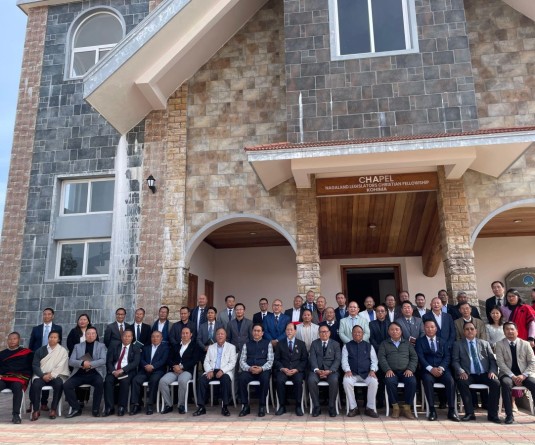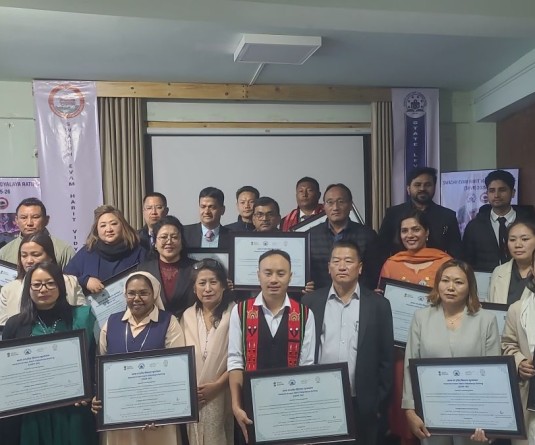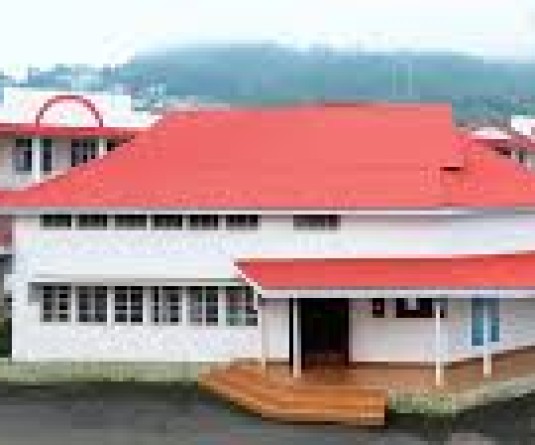Y. Kikheto Sema and others during the International Day against Drug Abuse and Illicit Trafficking programme at Heningkunglwa on June 26. (Morung Photo)

Our Correspondent
Kohima | June 26
Calling for a united front against drug and substance abuse, Principal Secretary of Law & Justice and Fisheries & Aquatic Resources, Nagaland, Y. Kikheto Sema on Thursday said that the Church and society must give top priority to addressing the growing menace.
Speaking at the International Day against Drug Abuse and Illicit Trafficking observance held at Heningkunglwa under Peren district, Kikheto said, “Being a Christian state, the Church and society must not shy away from creating awareness and promoting preventive measures.”
The event was jointly organised by Operation Salvage Rehabilitation Centre, Heningkunglwa; Zeliangrong Students’ Union, Nagaland (ZSUN); and Zeliangrong Youth Organisation, Nagaland (ZYON).
Stressing the importance of community-led action, he called for strengthening the "4 Cs" — Coordination, Cooperation, Confidence, and Contribution — to effectively fight the issue. He described the Church as the most influential institution in Nagaland, saying, “The community is more willing to listen to what is spoken from the Church platform.”
However, he lamented the lack of sensitisation efforts within the Church on drug-related issues. He urged religious institutions to conduct awareness programs through Sunday Schools, youth fellowships, women’s and men’s groups, and other Church platforms.
Kikheto also recommended a broad-based family approach involving early education, emotional support, health access, purpose-driven living, and creating a drug-free environment. Schools, he said, should incorporate the physical and mental consequences of drug abuse into their curriculum.
While acknowledging the State Government’s ongoing efforts despite constraints, he said a collective and coordinated approach involving law enforcement, education, treatment, rehabilitation, and community cooperation was needed for timely intervention and prevention.
Call to check cross-border drug inflow
Highlighting Nagaland’s proximity to Myanmar — a known drug trafficking route into Northeast India — Kikheto said preventing drug inflow remains a major challenge. “Since fencing the border is complicated due to familial ties across boundaries, Nagas on both sides of the
India-Myanmar border must work together as a community, society, and Church to counter the menace,” he said.
He also pointed to Manipur, which borders Nagaland, as another major transit route for drug trafficking, and called on all stakeholders to take urgent steps to prevent drug inflow through this corridor.
Stating that drug use was virtually unknown in Nagaland before the late 1980s and early 1990s, Kikheto attributed the rise in abuse to the porous international boundary with the Golden Triangle — comprising Myanmar, Thailand, and Laos — and to the community’s vulnerability to experimentation.
Other speakers at the programme included David Perie, Administrator, Operation Salvage Rehabilitation Centre; I. Tsungrosangla Ao, District Programme Officer, Social Welfare; Albert Ezung, ADC Jalukie; R. John Zeliang, President, ZYON; Enest Sephe, President, Zeme Council Nagaland; Dr. Rangro Herie, Education Secretary, ZBCC; Thangjamang, Kuki Students’ Organisation Nagaland; and Dr. Ramheigun, MO, Narcotic FIARTC + OST, Jalukie.
A pledge against drug abuse, illegal sales, organised crime, and stigma around addiction was administered by Vini Zhimomi.






